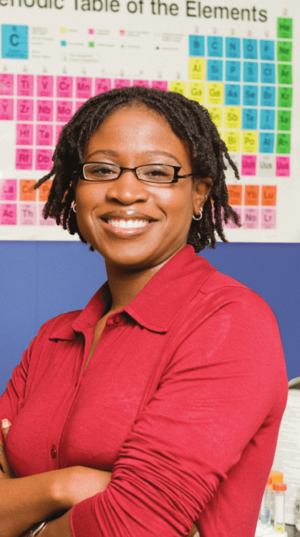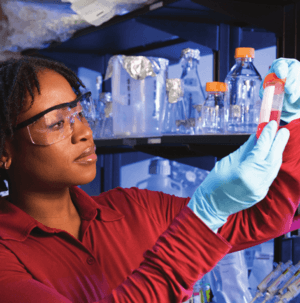Lola Eniola-Adefeso facts for kids
Quick facts for kids
Lola Eniola-Adefeso
|
|
|---|---|

Eniola-Adefeso in NIGMS Findings Magazine, 2009
|
|
| Born |
Maryland, USA
|
| Alma mater | University of Maryland, Baltimore County University of Pennsylvania |
| Scientific career | |
| Institutions | University of Illinois Chicago Baylor College of Medicine |
Omolola (Lola) Eniola-Adefeso is a Nigerian-American chemical engineer who is an expert in designing tiny particles to deliver medicine inside the body. She is the Dean of the College of Engineering at the University of Illinois Chicago.
Before this role, she was a professor at the University of Michigan. There, she taught chemical engineering, biomedical engineering, and other science subjects.
Besides her work at the university, Eniola-Adefeso also co-founded a company called Asalyxa Bio. Her company works on turning her research ideas into real treatments for diseases.
Contents
Education and Early Life
Eniola-Adefeso moved to Maryland from Nigeria when she was 16 years old. At first, she planned to go to medical school to become a doctor. However, she soon became fascinated with chemical engineering.
She went to the University of Maryland, Baltimore County and earned her degree in Chemical and Biomolecular Engineering in 1999. For her advanced degrees, she studied at the University of Pennsylvania, finishing in 2004.
Career and Research
Fighting Disease with Tiny Particles
After finishing her education, Eniola-Adefeso worked at the Baylor College of Medicine. In 2006, she joined the University of Michigan as a professor. A personal tragedy inspired much of her work. After her father died from heart disease, she decided to focus her research on finding new ways to treat it.
Her research looks at how to use tiny particles to carry medicine directly to the parts of the body that need it. This is called targeted drug delivery. Her lab made several important discoveries.
- They were the first to prove that the size, shape, and weight of these tiny particles matter. For the particles to reach the wall of a blood vessel, they need to have the right design.
- Her team studies how these particles work using models of human blood vessels. This helped other scientists understand that human blood is unique and different from animal blood in research.
Working with the Immune System
Eniola-Adefeso's lab also discovered new things about white blood cells, which are part of the body's immune system.
- They found that certain white blood cells, called neutrophils, quickly grab and "eat" the drug-delivery particles in the blood.
- Her team learned that human neutrophils prefer to eat particles shaped like tiny rods. This was a surprise because earlier research suggested that these cells did not eat rod-shaped particles well.
This discovery opened up a new way to treat diseases. Her company, Asalyxa Bio, is now using this idea to create a treatment for a serious lung condition called Acute Respiratory Distress Syndrome (ARDS).
Eniola-Adefeso is a Fellow, or a respected senior member, of the American Institute for Medical and Biological Engineers (AIMBE) and the Biomedical Engineering Society (BMES).
Helping Future Scientists
Eniola-Adefeso works hard to support women and students from minority groups in science and engineering. At the University of Michigan, she started a mentoring program to help guide students.
She also co-created a program called the NextProf Pathfinder Workshop. This program helps students in the early years of their PhD studies learn how to become successful professors. It gives them the skills they need to build a strong career in science. The program has been so successful that other major universities have joined.
In 2021, Eniola-Adefeso and other scientists pointed out that the National Institutes of Health (NIH), a major source of science funding, was not giving money fairly to Black researchers. Her efforts led to the head of the NIH making a public apology and promising to make changes.
Major Awards and Honors
Eniola-Adefeso has received many awards for her work in science and for her efforts to support diversity. Some of her most important honors include:
- 2021: MLK Visiting Professorship at MIT
- 2020: Named a Fellow of the Biomedical Engineering Society
- 2020: Named one of the Top 1000 Inspiring Black scientists in America by CellPress
- 2017: Named a Fellow of the American Institute for Medical and Biological Engineering
- 2011: National Science Foundation CAREER Award
- 1999: Meyerhoff Scholarship at the University of Maryland, Baltimore County
 | Tommie Smith |
 | Simone Manuel |
 | Shani Davis |
 | Simone Biles |
 | Alice Coachman |


